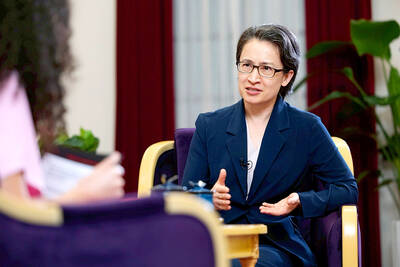Democratic Progressive Party (DPP) legislators yesterday paralyzed the budget review of the legislature's Education and Culture Committee in protest against the Ministry of Education's (MOE) China policy.
Although the DPP only accounted for three seats in the committee, all of the party's 27 legislators attended the meeting, holding up banners and posters to show their dissatisfaction with the ministry's plan to allow Chinese students to enroll in universities in Taiwan.
“We oppose [the acceptance of] Chinese credentials and do not welcome [Association for Relations Across the Taiwan Strait Chairman] Chen Yunlin (陳雲林),” they chanted.
The DPP caucus proposed that Minister of Education Cheng Jei-cheng (鄭瑞城) report on the ministry's China policy and its impact to the committee, despite the fact the committee was scheduled to review the ministry's budget requests for the next fiscal year.
“The MOE reached many major resolutions regarding the nation's education policy without special reports to the legislature,” DPP Legislator Kuan Bi-ling (管碧玲) said. “The changes include allowing students from China to attend universities in Taiwan and allowing universities to offer continuing education programs in China. [The MOE also resolved to adopt] Hanyu pinyin as our nation's major Romanization system, even though the adoption remains controversial.”
The ministry was conducting “under-the-table deals,” Kuan said, adding that recent opinion polls showed that as many as 60 percent of respondents had reservations about recognizing Chinese credentials.
The ministry had submitted its proposed amendment to the University Law (大學法) to the Executive Yuan to seek to legalize Chinese students' enrollment in universities in Taiwan.
The proposal will be referred to the legislature for review next week.
In a bid to smooth the path for the review of the ministry's budget requests, People First Party Legislator Lin Cheng-er (林正二), head of the committee, invited pan-blue and pan-green lawmakers to discuss the meeting's agenda.
But during the negotiation, a heated exchange broke out between Chinese Nationalist Party (KMT) caucus deputy secretary-general Yang Chiung-ying (楊瓊瓔) and DPP legislators Lin Shu-fen (林淑芬) and Chen Ting-fei (陳亭妃).
Yang accused the DPP lawmakers of giving the legislature's secretariat a hard time, while Lin and Chen accused the KMT-dominated committee of being too easy on the ministry's proposals.
The meeting was later adjourned as both sides failed to reach any agreement.

Temperatures in northern Taiwan are forecast to reach as high as 30°C today, as an ongoing northeasterly seasonal wind system weakens, the Central Weather Administration (CWA) said. CWA forecaster Tseng Chao-cheng (曾昭誠) said yesterday that with the seasonal wind system weakening, warmer easterly winds would boost the temperature today. Daytime temperatures in northern Taiwan and Yilan County are expected to range from 28°C to 30°C today, up about 3°C from yesterday, Tseng said. According to the CWA, temperature highs in central and southern Taiwan could stay stable. However, the weather is expected to turn cooler starting tonight as the northeasterly wind system strengthens again

The Ministry of Foreign Affairs (MOFA) yesterday expressed “grave concerns” after Singaporean Prime Minister Lawrence Wong (黃循財) reiterated the city-state’s opposition to “Taiwanese independence” during a meeting with Chinese Premier Li Qiang (李強). In Singapore on Saturday, Wong and Li discussed cross-strait developments, the Singaporean Ministry of Foreign Affairs said in a statement. “Prime Minister Wong reiterated that Singapore has a clear and consistent ‘one China’ policy and is opposed to Taiwan independence,” it said. MOFA responded that it is an objective fact and a common understanding shared by many that the Republic of China (ROC) is an independent, sovereign nation, with world-leading

COOLING OFF: Temperatures are expected to fall to lows of about 20°C on Sunday and possibly 18°C to 19°C next week, following a wave of northeasterly winds on Friday The Central Weather Administration (CWA) on Sunday forecast more rain and cooler temperatures for northern Taiwan this week, with the mercury dropping to lows of 18°C, as another wave of northeasterly winds sweeps across the country. The current northeasterly winds would continue to affect Taiwan through today, with precipitation peaking today, bringing increased rainfall to windward areas, CWA forecaster Liu Pei-teng (劉沛滕) said. The weather system would weaken slightly tomorrow before another, stronger wave arrives on Friday, lasting into next week, Liu said. From yesterday to today, northern Taiwan can expect cool, wet weather, with lows of 22°C to 23°C in most areas,

DEFENDING FREEDOM: Taiwanese love peace and helping others, and hope to be a positive force in the world, Vice President Hsiao Bi-khim told ‘Weltspiegel’ Taiwan is making every effort to prevent war in the face of China’s hybrid coercion tactics and military threats, Vice President Hsiao Bi-khim (蕭美琴) said in an interview with German public broadcaster ARD’s program Weltspiegel that aired on Monday. Taiwan is not seeking provocation or intending to disrupt international order, but “must possess the capacity for self-defense,” a news release issued by the Presidential Office yesterday quoted her as saying. Taiwan is closely watching not only the increasing scope and frequency of Chinese military exercises around the nation, but also Beijing’s hybrid and cognitive warfare tactics, including manipulating public opinion, fostering